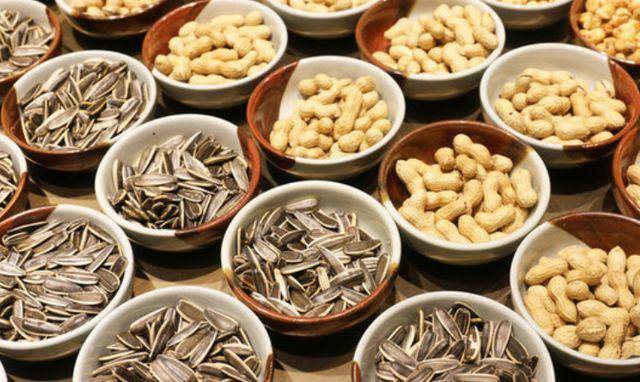As is well known, there are many types of nuts with rich flavors and abundant nutrients, making them a popular choice for snacking while binge-watching or visiting relatives.
In fact, both melon seeds and peanuts are types of nuts commonly seen in daily life. Especially when watching TV, it’s common to snack on melon seeds or peanuts, which can have certain health benefits.
However, some netizens have pointed out that melon seeds and peanuts contain a lot of fatty substances. Excessive consumption may affect weight loss efforts. Is there any scientific basis for this claim?
In reality, while consuming melon seeds and peanuts, one may lead to weight gain, while the other may contribute to weight loss. If you are interested, why not follow along with me to find out more? It might help with your weight loss journey.
1. Calories
In 100 grams of melon seeds, there are approximately 560 calories; in 100 grams of peanuts, there are around 580 calories. Looking at this, peanuts have higher calories compared to melon seeds. So, which food would aid in weight loss?
2. Fat Content
Comparatively, melon seeds contain more fat than peanuts. 100 grams of melon seeds contain over 40 grams of fat. However, the fat content in peanuts is relatively lower. Moreover, the fat in melon seeds is saturated fat. Prolonged consumption of melon seeds may lead to an increase in cholesterol levels.
Therefore, individuals aiming to lose weight can consume peanuts in moderation. Peanuts have relatively lower fat content, and the fats present are unsaturated fats. This can accelerate the burning of fats in the body, expending energy.
In addition, peanuts are rich in dietary fiber, promoting gastrointestinal function, enhancing intestinal motility, improving digestion, and efficiently eliminating waste and toxins, leading to a cleansing effect.
Moderate consumption of peanuts can help hasten the body’s metabolic rate, improve the internal environment, and contribute to weight loss to some extent.
Moreover, peanuts provide more benefits beyond weight loss; they contain various trace elements and vitamins that can slow down aging, enhance memory, support development, and maintain skin health to a certain degree.
Have you ever noticed the composition of peanuts? Peanuts have a red skin layer. I suggest not removing this layer while eating because it holds high nutritional value and can aid in blood nourishment, benefiting overall health by replenishing blood and enhancing complexion.
Compared to melon seeds, it is advised to consume more peanuts and fewer melon seeds.
Due to its high calorie and fat content, excessive consumption of melon seeds might impede weight loss efforts and pose a risk of obesity.
During the production of melon seeds, additives, salt, or sugar may be added. It is advisable to avoid varieties like caramelized melon seeds, cream-coated melon seeds, green tea melon seeds, as although they offer a rich taste and unique flavors, they contribute to elevated caloric content by adding excessive amounts of sugar and salt. Prolonged consumption may lead not only to obesity but also adverse effects on cardiovascular health, hindering physical well-being.
Melon seeds may affect weight loss efforts; however, this does not negate their nutritional value. It is well-known that melon seeds are rich in zinc, hence consuming them in moderation can aid in blood nourishment, especially beneficial for individuals with iron-deficiency anemia.
While using them, it is crucial to control the amount consumed, ideally around 50 grams, avoiding excessive intake and opting for plain-flavored melon seeds.
1. Tomato and Egg Stir-Fry
Tomato and egg stir-fry, a common home-cooked dish paired with steamed rice, is a popular choice loved by many for its flavors and nutritional content. Consuming it in moderation provides necessary nutrients to the body. But why should one avoid tomato and egg stir-fry while trying to lose weight?
It’s because this dish requires a considerable amount of cooking oil during preparation. Oil is used both when frying the eggs and sautéing the tomatoes, making it relatively rich in fats. Hence, it is advisable to consume this dish sparingly.
2. Sour and Spicy Shredded Potatoes
Crispy and appetizing, sour and spicy shredded potatoes are a favorite side dish that enhances appetite and is easily paired with rice, particularly during summers. However, it’s crucial to note that potatoes are rich in starch and fats and have a high oil-absorption capacity. Hence, it is not recommended to consume excessive shredded potatoes during weight loss regimes.
3. Leguminous Vegetables
Leguminous vegetables are rich in proteins but also high in carbohydrates. It’s suggested to incorporate leguminous vegetables as a staple food, as stir-frying them may potentially impact weight loss efforts.
Take fava beans, for example; in 100 grams, they contain over 110 calories. During cooking, fava beans tend to absorb significant amounts of fats. After ingestion, these fats accumulate in the body, posing adverse effects on weight loss.
Do you enjoy any of the mentioned foods? Friends in front of the screen, do you have any effective weight loss tips? Feel free to share your thoughts in the comments section to facilitate mutual learning.
#HealthKnowledgeSharing#


